From dreams deferred to dreams realized: i-Saksham’s journey with young women leaders in Bihar through its flagship Edu-leaders’ fellowship program
For many young women in rural Bihar, the path after school is filled with obstacles. These include societal expectations, early marriage, and limited opportunities. These challenges often cut short their dreams. But what happens when they are given support, space, and belief in themselves? Through the Edu-Leaders Fellowship, i-Saksham is helping young women to rewrite their stories. This article reflects on how these women reclaim education, build confidence, enter the workforce, and inspire their communities, transforming ‘life after school’ from a story of loss to one of hope and resurgence.
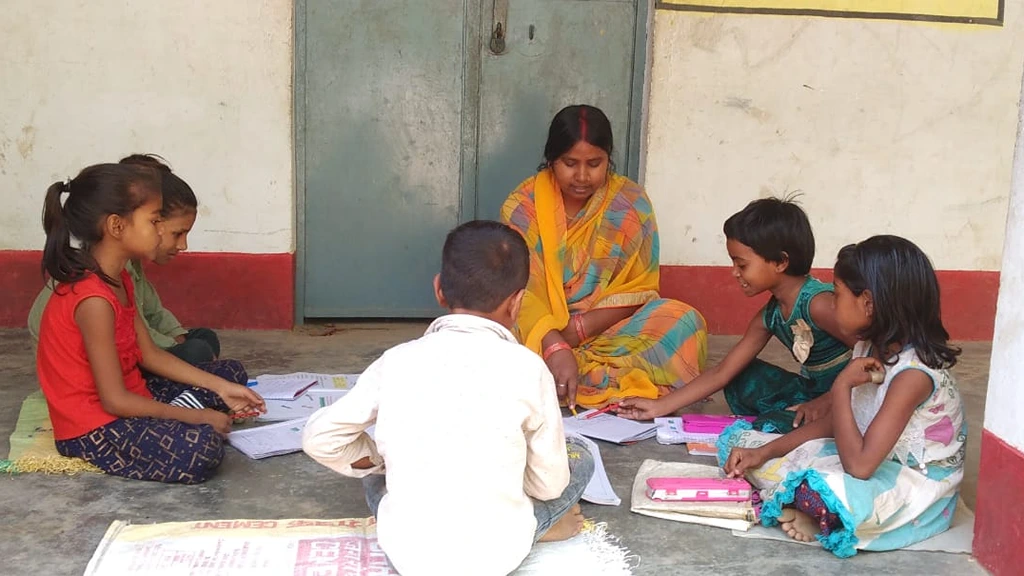
“At 39, I’m feeling like the 20-year-old version of myself, bursting with dreams and determination,” says Indira, beaming with pride. “Nobody else outside i-Saksham would have given me this chance.”
Married off at 20 and caught in domestic duties for nearly two decades, her dreams of becoming an IAS officer seemed like a distant memory—until the i-Saksham fellowship changed her trajectory.
Building hope in a geography of erasure
Bihar’s young women are born into a geography of erased potential. Here, the collusion of caste hierarchies, patriarchal economies and state neglect conspires to bury their dreams before they take root. Eighty-eight percent are pushed out of higher education—not by choice, but by design, as families prioritize dowries over degrees. Forty-three percent are shackled into early marriages; their bodies commodified to cement alliances and transfer the ‘burden’ of their care. Ninety-six percent vanish from the workforce.
These girls and women are condemned to lifetimes of unpaid domestic servitude. This labor fuels households. However, it is erased from GDPs and dignity. The statistics are not mere numbers. They are testaments to structural violence.
This is more than tradition. It is a long-standing social pattern, one shaped by unequal opportunities handed down through generations. Bihar’s slow progress in development is closely linked to the undervaluing of women’s work and the silencing of their hopes. As the state continues to lag in Sustainable Development Goals (SDGs), it reflects a wider truth about India’s growth. Much of it rests on the hidden efforts and unfulfilled dreams of women.
The i-Saksham’s story
In this context, i-Saksham Education and Learning Foundation was founded in 2015 by three Prime Minister’s Rural Development Fellows (PMRDF). The organization was founded on the conviction that true development is not possible without grassroots leadership. Its flagship Edu-leaders Fellowship trains young women (usually 18-35 years of age) from remote, under-resourced communities in Bihar to become educational change-makers and community leaders.
Stories of grit and growth
Over two years, the fellows work in their village in the community, underserved government schools in their neighborhoods or in adolescent girls’ clubs. In the process, they build teaching and facilitation skills, engage with parents and take ownership of children’s learning outcomes. More importantly, they begin to believe in their potential again. Here, we share some of their stories.
Seema Kumari, 36, a once shy stay-at-home mother from Gaya, was married off at 17, immediately after clearing her 12th board exams in 2006. Her education stalled, and life moved on. Yet, 14 years later, when she joined i-Saksham’s fellowship in 2020, she decided to resume her education. Today, she has completed her bachelor’s degree while simultaneously working to bring girls who dropped out of school from interior villages in Gaya. “I never imagined I would get a second chance and now I ensure that every girl is in school,” she shares.
Aanchal’s story is one of quiet determination. She knew the cost of letting opportunities slip. She went on from being a fellow in rural Bihar to becoming a peer mentor. Then she worked with the JSW Fellowship in Maharashtra. She is now a scholarship recipient pursuing her master’s at Azim Premji University. Every step forward is a conscious choice to shape her own path. She refuses to be pulled back into the life society once planned for her.
These are not isolated stories. They are emerging patterns among the girls and their peers they influenced and their families, across all five districts where the i-Saksham Edu-leaders (fellows) are present.
For Taniya Parween, once mocked as the eldest unmarried girl in her remote, naxal-affected village in Munger, mere taunts no longer define her. Instead, she draws strength from how she has steadily seized every chance to learn and grow. Beginning as a 16-year-old fellow in i-Saksham’s first batch, she rose through the ranks. She became a community facilitator and then a district-level teacher trainer at DIET. Now, she prepares to take on the honor of being a Young India Fellow at the Ashoka University.
In that period, she managed to dodge her father’s plan to get her married as soon as she reached 18, had her family build a pukka house (as her father desired), got her mother a fridge, and got her siblings better education. She is now consulted on all major decisions in her household and among relatives.
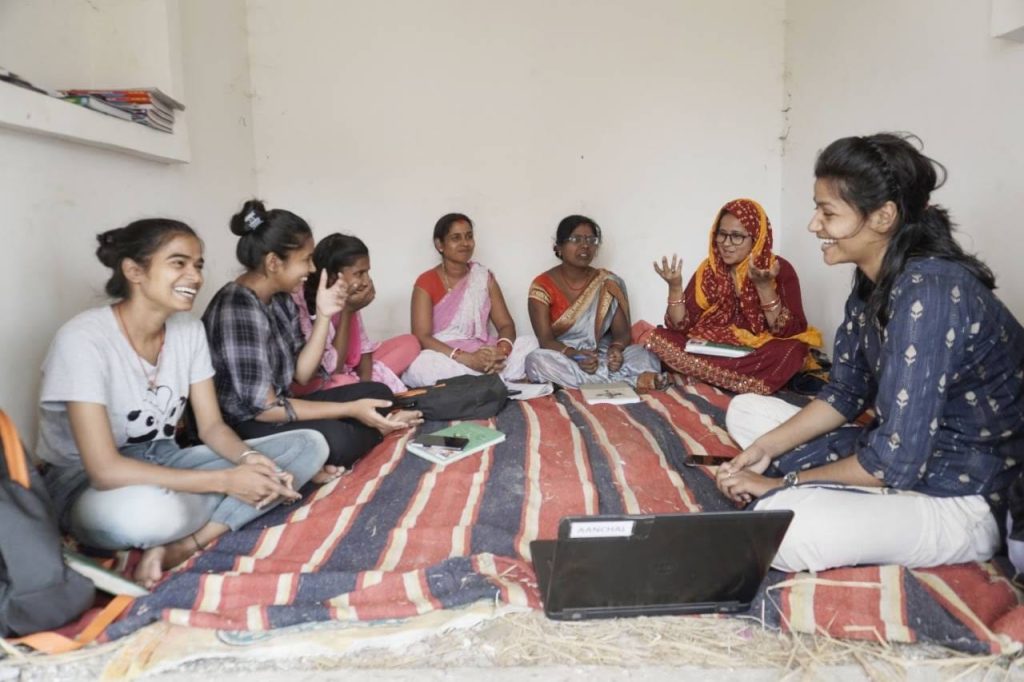
Photo credit: i-Saksham communications team
Life after school, reimagined
At i-Saksham, we have seen that life after school doesn’t start with placement cells or career counseling. It starts much earlier with the idea that young women can choose, that their dreams are valid, that voice precedes choice.
In a place where silence has long been a survival strategy, we now see women speak about careers, community and courage. They are building a new grammar for ‘life after school’, one defined not by restrictions but by possibility.
After getting married at 20, Indira’s aspirations of becoming an IAS officer were put on hold. She felt trapped, her life revolving around family care. But i-Saksham’s fellowship program changed everything. She assisted in a government school, engaging with parents and finding joy in her fellowship work.
Nearly 95% of i-Saksham fellows are first-generation learners. Most of these are young women who are the first in their families to pursue education beyond school. Among them, around 23 have studied at Azim Premji University. A few others have attended premier institutions like TISS and JNU.
For many girls, completing class 12 is itself a major milestone. This is often celebrated as a family achievement. Yet, after class 12, most drop out due to societal pressures. They are seen as ‘too old’ for marriage by conservative norms.
They also struggle to find equally educated spouses, as marriage remains a family’s top priority to relieve economic burdens.
Joining the i-Saksham fellowship gives these young women two years of intensive learning and a nurturing environment that supports their continued education. Remarkably, 100% of fellows who have completed class 12 have enrolled in bachelor’s degree programs after joining the fellowship.
To further ease access to higher education, i-Saksham offers financial aid through crowdsourcing for fellows facing economic hardships. This enables them to pursue distance learning opportunities like those offered by IGNOU and continue their academic journeys.
After the fellowship, Indira is thriving in her new role at a bank. “My relatives are surprised that without any competitive exams and a commerce degree, I got placed in a bank and was promoted in just six months…and at my age!” she exclaims.
Indira and Seema’s journeys are a testament to the power of second chances. As she pursues her graduation, despite an 18-year educational gap, Seema’s clarity is evident as she shared, “I am proud of this identity of mine. I am a confident woman, capable of any sort of negotiation.”
Nandini’s story
Nandini had a two-year-old toddler when she went out for her first day of the i-Saksham fellowship. This was despite being warned at home that if she stepped out, she might never be allowed to walk back again. For six years after being married at the age of 17, she hadn’t crossed her front door. That day, she did. And everything changed.
Through the fellowship, Nandini supported children in under-resourced schools. She mobilized her community and discovered a voice she didn’t know she had. She assimilated what she was learning, and she lived it by building confidence, skill and conviction. After completing the program, she returned as a peer mentor to support new Edu-leaders, embodying what it means to grow and give back.
A year later, she joined Aditya Birla Education Initiative and started facilitating sessions for newly recruited government teachers at DIET, Lakhisarai. Within five months, Bihar’s Department of Education recognized her as one of the top three teacher trainers in the state. Today, Nandini is pursuing her second master’s degree and preparing for a PhD. These are ambitions she once couldn’t have spoken aloud, let alone chased.
In a recent session, she shared, “If you’re getting an opportunity for the first time in your life, you shouldn’t miss it. We never know where it might take us—if we work hard and persevere.”
Women like Nandini know that life rarely offers second chances. So, when the first one arrived with the i-Saksham fellowship, they held on to it—not just to change their own lives, but to prove that transformation is possible, even in the most constrained realities.
In conclusion
What makes the i-Saksham model effective is not just skilling but sustained collective nurturing. Fellows receive mentoring, digital tools, safe spaces for reflection and peer-led support groups. They engage with institutions—schools, panchayats, SHGs—not just as beneficiaries but as change agents. Over time, they begin to ask: what else is possible—not just for me, but for others like me?
Over the last six years, i-Saksham has nurtured more than 650 young women leaders. By mid-2025, we estimate that we have had 1,100+ Edu-leaders (both current and alumni), impacting around 10,000 children and influencing around 20,000 of their peers directly.
Graduates of the fellowship have gone on to pursue higher education in places like Azim Premji University, IGNOU and local colleges. They have found employment in NGOs, microfinance institutions and schools. They have also become entrepreneurs through digital services and home-run learning centers. Some are serving in leadership roles within i-Saksham itself, mentoring new fellows. Others have become the first salaried women in their families. They have inspired siblings and peers to delay marriage and pursue further study. And many have found the confidence to say, “I matter”.
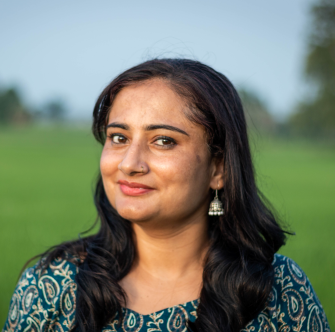
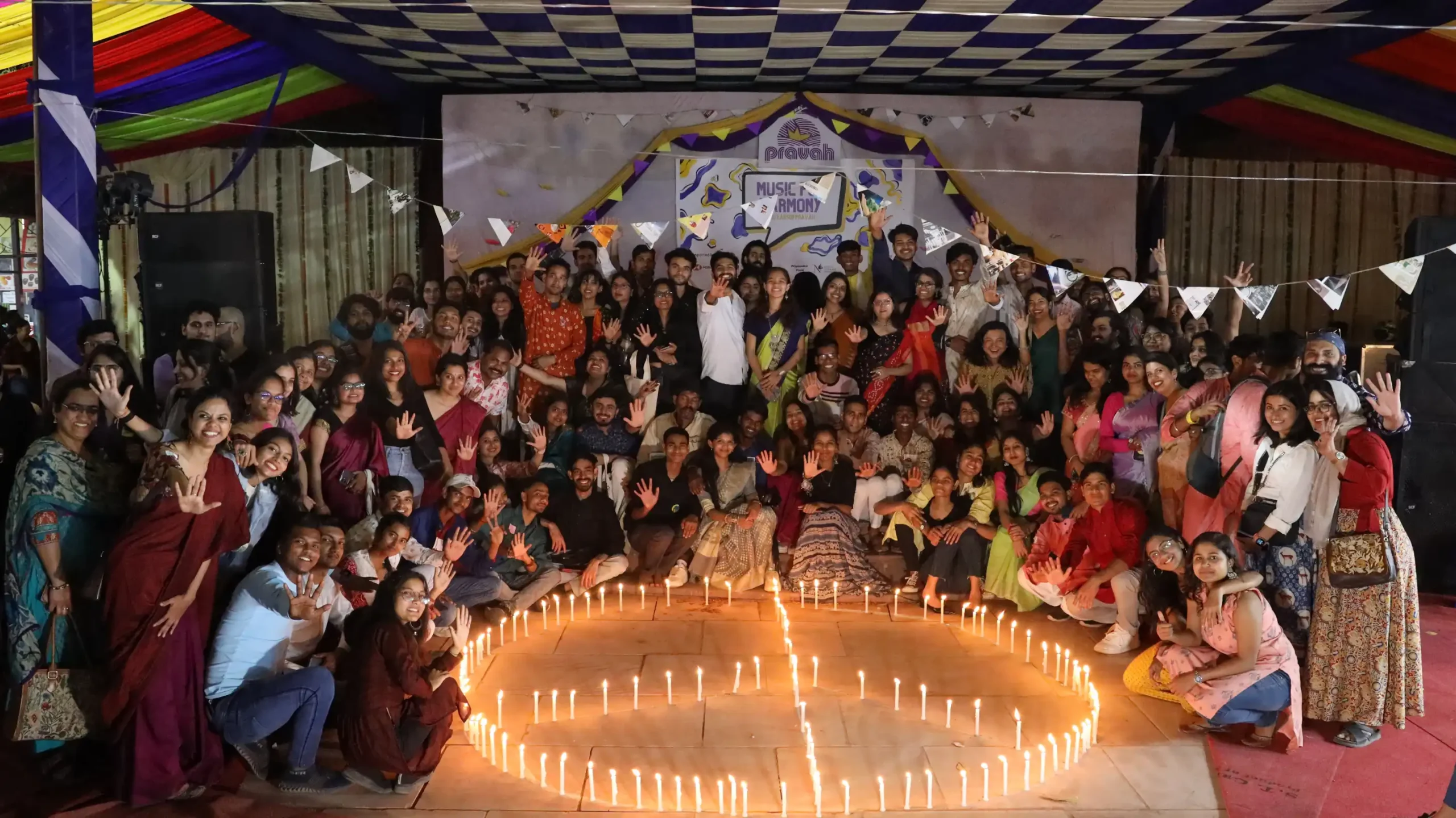
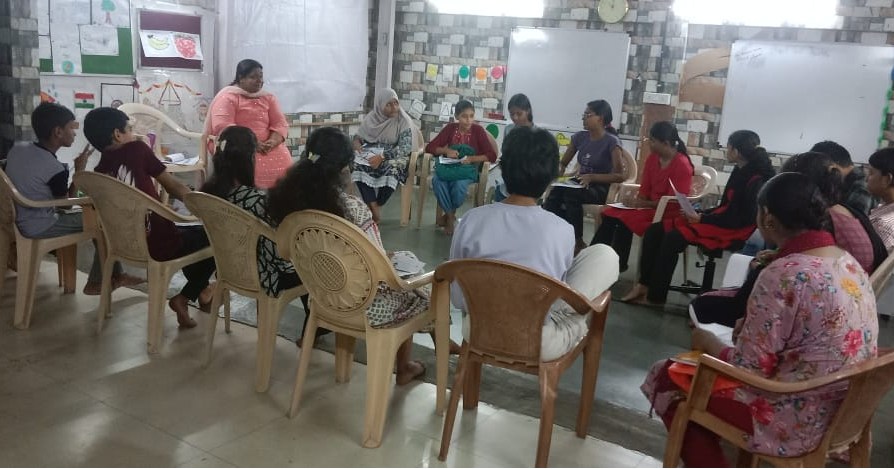

No approved comments yet. Be the first to comment!